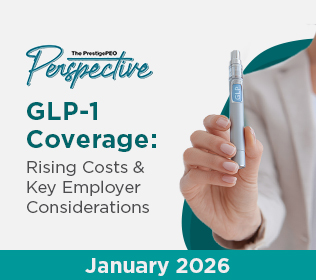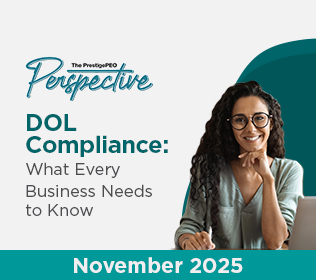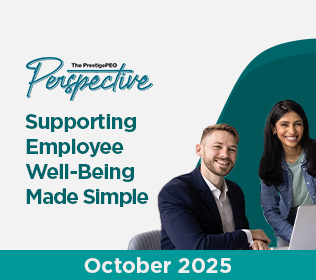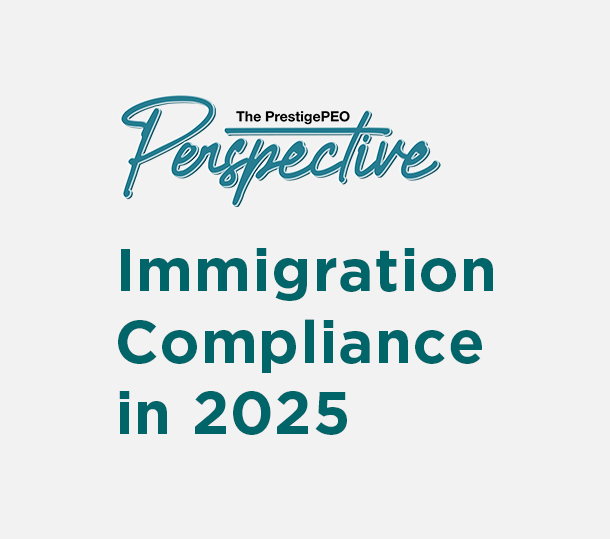

ICYMI: What Employers Need to Know About Immigration Compliance
Immigration enforcement is evolving quickly, and the stakes for employers are high. In our recent webinar, Fisher Phillips Partner Brian Coughlin joined PrestigePEO’s VP & General Counsel Elisabeth Shaw to explore the latest I-9 requirements, ICE audits, and what to expect from immigration compliance in 2025. If you missed the session, catch up now and stay ahead of shifting policies, documentation best practices, and enforcement trends.

Why a PEO Partnership is a Strategic Move for SMBs in 2025
How a PEO Partnership Positions SMBs for Success
Managing HR on your own can stretch resources thin and take focus away from growing your business. That’s where a PEO partnership comes in. In case you missed it, this article highlights five keyways PrestigePEO helps SMBs manage HR, reduce compliance risks, offer competitive benefits, and support long-term growth.

The True Cost of Non-Compliance: Why Businesses Need PrestigePEO
Protect Your Business, Reduce Risk, and Focus on Growth with PrestigePEO
Did you know the average cost of non-compliance is now $14.82 million? Many SMBs underestimate just how costly compliance missteps can be—leading to legal fees, business disruption, and reputational damage. In case you missed it, this article breaks down the real financial risks of non-compliance and shows how PrestigePEO helps businesses protect their operations with proactive HR, payroll, and benefits support.

Workers’ Compensation That Works for You
Protect Your People and Your Business with PrestigePEO
Unexpected workplace injuries can create major disruptions, but with PrestigePEO, you don’t have to face them alone. Our workers’ compensation and risk mitigation services are designed to protect your team and your business. From streamlined claims support to workplace safety programs and OSHA compliance guidance, we help you minimize risk and stay focused on what matters most: running your business.

Simplify Payroll, Empower Your Business
Payroll Solutions Tailored for Growing Businesses
Managing payroll in-house can be time-consuming and have compliance risks. PrestigePEO offers comprehensive payroll solutions designed specifically for small and medium-sized businesses.
Our team of FPC and CPP certified professionals ensures accurate, timely payroll processing, tax filings, and compliance with all local, state, and federal regulations. By partnering with us, you can reduce administrative burdens, minimize errors, and focus on growing your business.
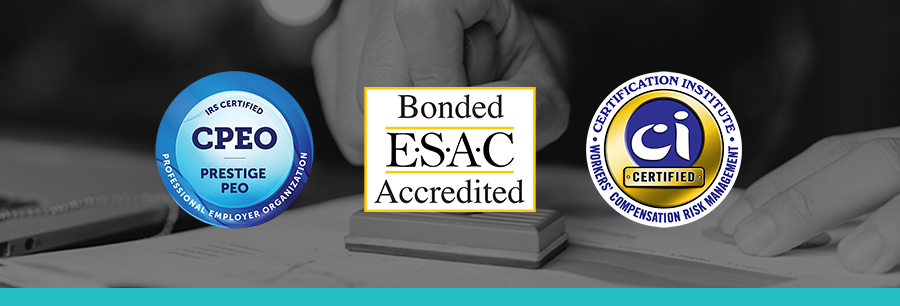
Certified Trust: PrestigePEO’s Commitment to Excellence
Setting the Standard in PEO Excellence
At PrestigePEO, we don’t just meet industry standards, we exceed them. We’re proud to be among the elite 1% of PEOs nationwide to hold all three of the industry’s most trusted certifications: IRS Certified PEO (CPEO), ESAC accreditation, and the Certification Institute’s Workers’ Compensation Risk Management Certification.
These designations aren’t just credentials, they’re proof of our commitment to financial strength, ethical practices, and dependable risk management. When you partner with PrestigePEO, you gain the confidence of working with a team that’s recognized for doing things the right way.
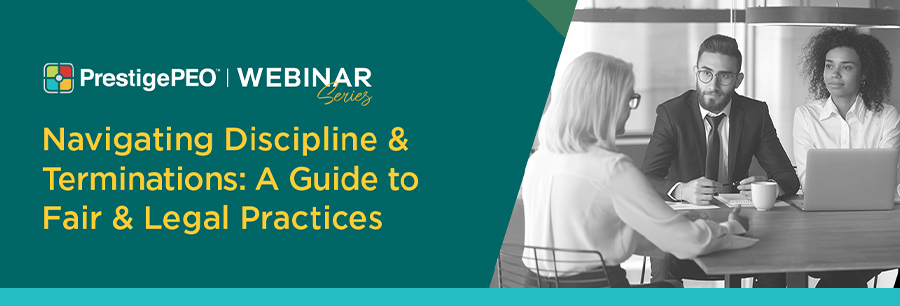
Navigating Discipline and Terminations: A Guide to Fair & Legal Practices
Guidance for Fair, Legal, and Effective Employee Management
Handling employee discipline and terminations isn’t easy and getting it wrong can open the door to legal risk. In case you missed it, this webinar walks SMB leaders through the right way to manage these sensitive processes. You’ll gain expert insights from PrestigePEO’s HR and legal professionals on progressive discipline, documentation, compliance, and how to navigate terminations with confidence.

United States Treasury Department Shifts Gears on the Corporate Transparency Act
After monitoring the shifting deadlines imposed by the Financial Crimes Enforcement Network (FinCEN) regarding the filing requirements of either initial, updated, and/or corrected beneficial ownership reports (BOI) under the Corporate Transparency Act (CTA), as well as the related court challenges, the U.S Department of the Treasury announced in early March that it will no longer be enforcing penalties or fines associated with the BOI reporting rule violations under the current deadlines and it will no longer enforce any penalties or fines against U.S. citizens or domestic reporting companies or their beneficial owners under the upcoming reporting rule changes. Furthermore, the Treasury Department is considering a proposed rule that will narrow enforcement provisions to foreign reporting companies only, which would otherwise remove such reporting obligations from U.S. citizens and domestic companies entirely.
PrestigePEO is here to help. Our team is actively monitoring regulatory changes that may impact on your business. If you’re unsure how these updates apply to your organization or need help navigating them connect with us today to learn how our HR experts can support your compliance needs.

Court Ruling Reinforces ADA Accommodation Standards
In a recent decision, Tudor v. Whitehall Central School District, the Second Circuit Court of Appeals, covering New York, Connecticut, and Vermont, reaffirmed the importance of employers engaging in the ADA-required interactive process. The court held that a reasonable accommodation may be required even if a qualified employee can perform the essential functions of their job without one.
The case involved a teacher with post-traumatic stress disorder (PTSD) who had previously been permitted to leave campus during prep periods to manage her symptoms. When the school district rescinded that long-standing accommodation, she requested that it be reinstated. The district declined, partly because she acknowledged being able to perform her duties without the accommodation, and she brought a failure to accommodate claim. The Second Circuit rejected that reasoning, holding that the ADA requires employers to accommodate known disabilities unless doing so would impose an undue hardship, regardless of whether the employee can perform the essential functions without it.
Key Takeaway for Employers
While the ruling doesn’t change the core guidance we typically give clients, which is to engage in the interactive process and provide reasonable accommodation to qualified employees, the case offers a notable clarification. An employee’s ability to perform their job duties without accommodation does not eliminate the employer’s legal obligation to evaluate and potentially provide one.
This decision reminds us to approach all accommodation requests thoughtfully and consistently with ADA standards, even when the employee performs well without any accommodation.
PrestigePEO is here to help your business stay compliant and prepared. If you’re navigating new regulations or unsure how changes may impact your organization, our team is ready to support you. Contact us to learn how our HR and compliance experts can help you move forward with confidence.
- This is a key reminder for SMBs: ADA compliance isn’t just about job performance—it’s about the process. PrestigePEO can help ensure your workplace policies align with evolving legal standards.

California Lawmakers Propose Restrictions on AI Use in Employment Decisions and other AI Targeted Protections
As California continues to break ground with the use of Artificial Intelligence “AI,” lawmakers propose limitations on the use of automated decision systems (ADS) in employment related settings that include hiring, promoting, disciplining, and termination decisions. Senate Bill 7 seeks to regulate employers use of AI forward management tools designed to help manage workforce issues. This bill would apply to all employers, without exception for size. If passed, the bill would create guardrails around the use of automated decision systems and would require a number of compliance obligations. Included in these requirements is a mandate that human oversight be involved in all major employment decisions, a notice requirement informing employees when ADS will be used in employment decisions, a requirement to ensure that employees have access to and ability to correct all data used by ADS, and an appeals process by which employees could contest ADS related employment decisions. There are a number of prohibited uses as well, including the use of ADS functions that predict employee behavior, the use of systems that collect sensitive personal data that may lead to discrimination of protected classes, and relying on customer ratings or similar AI-generated algorithms for employment decisions.
Additional workplace regulations being considered include Assembly Bill 1018 which seeks to create restrictions on the use of AI in employment but on a broader scale imposed on both employers and AI vendors. Restrictions would impact data retention policies, impose audit requirements, and provide for comprehensive risks assessments for AI utilized hiring methods.
California employers are encouraged to keep an eye on whether these proposed new laws pass and whether significant debate ensues, which may modify the original language of the proposed bills. These bills have until mid-September to reach Governor Newsom, who would have until October 12 to sign or veto the passed legislation.
An additional effort by the state to take control of the use of AI in the employment setting includes the March 21 decision of California Civil Council of the Civil Rights Department (CRD) to approve rules regarding the use of ADS in the workplace targeted directly at protecting against employment discrimination. These new rules must now be passed by the Office of Administrative Law (OAL) and finally, published by the Secretary of State. If approved, these rules will likely become effective on July 1, 2025. Included in these rules will be a clear definition of what “automated decisions” systems are and how they work, clear prohibition against ADS discrimination, an expansion of liability for those principles involved in the development of ADS technology and increased record keeping requirements.
If passed, these laws would impact on all employers, regardless of size. Additional rules aimed at preventing AI-based discrimination in the workplace may also take effect in July 2025.
PrestigePEO is closely monitoring these developments and can help your business stay ahead of compliance changes tied to AI and employment law.
PrestigePEO is here to help your business stay informed and prepared. As AI regulations evolve, our team will continue to monitor new legislation and provide clear, actionable updates. Have questions about how these changes could affect your hiring or HR practices? Contact us to learn how we can support your compliance strategy.

New York Legislature Targets Worker Misclassification
The New York State Senate has passed legislation to curb the misclassification of employees as independent contractors. Senate Bill S1514, approved on March 4, 2025, would authorize the Commissioner of Labor to issue stop-work orders against businesses that knowingly misclassify workers or provide false information about their workforce to insurance carriers.
Under the bill, employers in violation would receive written notice and have 72 hours to correct the issue before the stop-work order takes effect. If they fail to comply, operations at the site of the violation could be shut down until the business comes into compliance and pays any required penalties. Penalties could range from $1,000 to $5,000 per day, and employees affected by the shutdown would be entitled to receive their regular wages for up to ten days. Employers would have the right to contest the order within ten days of its issuance.
A companion bill, Assembly Bill A6664, was introduced in the State Assembly on March 7, 2025, and is currently being reviewed by the Assembly Labor Committee. The coordinated push by both chambers signals that worker classification remains a top priority for state lawmakers.
Employers in New York should take this opportunity to review their use and classification of independent contractors to ensure compliance with current classification laws.
With a companion bill advancing in the Assembly, this signals increased enforcement ahead. Now is the time for SMBs in New York to review contractor classifications and ensure compliance.
As worker classification laws evolve, PrestigePEO is here to help your business stay compliant and avoid costly penalties. We’re actively monitoring the legislation and can provide the guidance you need to stay ahead. Reach out to learn how our HR and compliance experts can support your team.
